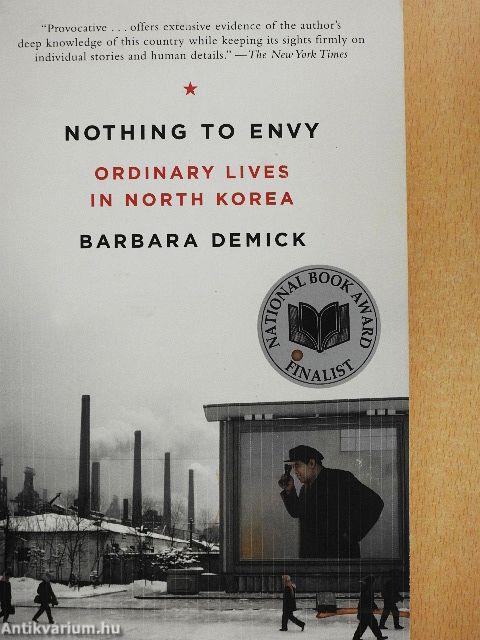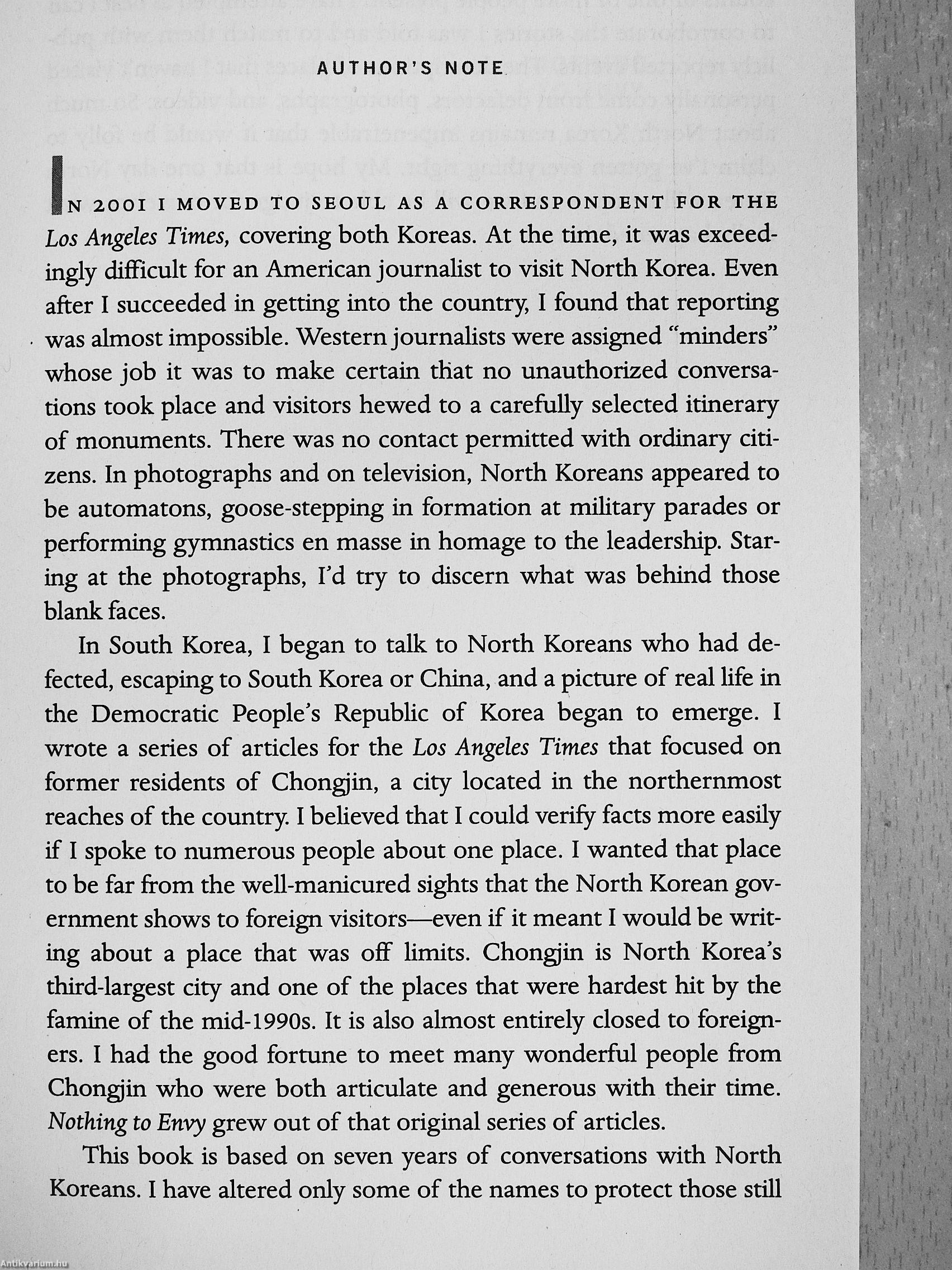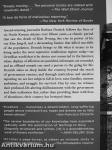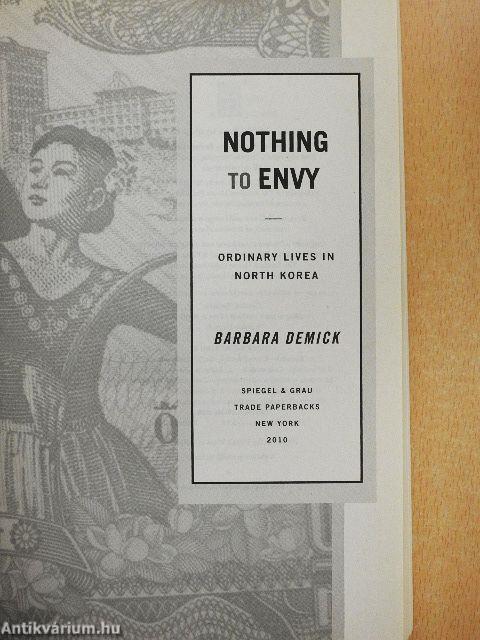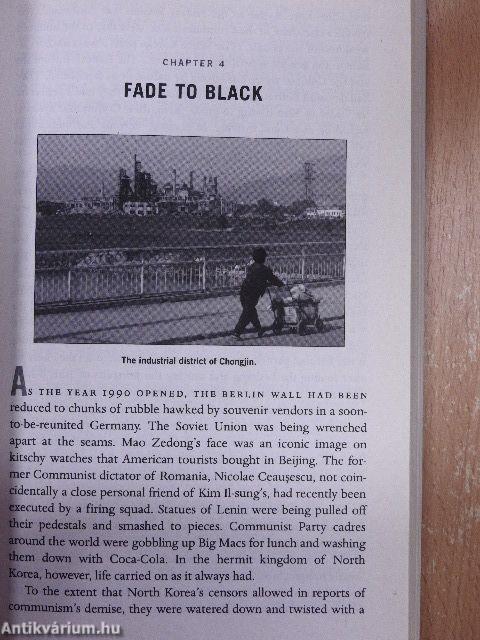1.066.806
kiadvánnyal nyújtjuk Magyarország legnagyobb antikvár könyv-kínálatát

VISSZA
A TETEJÉRE
JAVASLATOKÉszre-
vételek
Nothing to Envy
Ordinary Lives in North Korea
| Kiadó: | Spiegel & Grau Trade Paperbacks |
|---|---|
| Kiadás helye: | New York |
| Kiadás éve: | |
| Kötés típusa: | Ragasztott papírkötés |
| Oldalszám: | 316 oldal |
| Sorozatcím: | |
| Kötetszám: | |
| Nyelv: | Angol |
| Méret: | 20 cm x 13 cm |
| ISBN: | 978-0-385-52391-2 |
| Megjegyzés: | Fekete-fehér fotókkal. |
naponta értesítjük a beérkező friss
kiadványokról
naponta értesítjük a beérkező friss
kiadványokról
Előszó
TovábbFülszöveg
"Deeply moving . . . The personal stories are related with novelistic detail." —The Wall Street Journal
"A tour de force of meticulous reporting."
—The New York Review of Books
Award-winning journalist Barbara Demick follows the lives of six North Korean citizens over fifteen years—a chaotic period that saw the death of Kim Il-sung, the rise to power of his son Kim Jong-il, and a devastating famine that killed one-fifth of the population. Demick brings to life what it means to be living under the most repressive totalitarian regime today—an Orwellian world that is by choice not connected to the Internet, where displays of affection are punished, informants are rewarded, and an offhand remark can send a person to the gulag for Hfe. Demick takes us deep inside the country, beyond the reach of government censors, and through meticulous and sensitive reporting we see her subjects fall in love, raise families, nurture ambitions, and struggle for survival. One by one, we witness... Tovább
Fülszöveg
"Deeply moving . . . The personal stories are related with novelistic detail." —The Wall Street Journal
"A tour de force of meticulous reporting."
—The New York Review of Books
Award-winning journalist Barbara Demick follows the lives of six North Korean citizens over fifteen years—a chaotic period that saw the death of Kim Il-sung, the rise to power of his son Kim Jong-il, and a devastating famine that killed one-fifth of the population. Demick brings to life what it means to be living under the most repressive totalitarian regime today—an Orwellian world that is by choice not connected to the Internet, where displays of affection are punished, informants are rewarded, and an offhand remark can send a person to the gulag for Hfe. Demick takes us deep inside the country, beyond the reach of government censors, and through meticulous and sensitive reporting we see her subjects fall in love, raise families, nurture ambitions, and struggle for survival. One by one, we witness their profound, Ufe-altering disillusionment with the government and their realization that, rather than providing them with Hves of abundance, their country has betrayed them.
"Excellent . . . humanizes a downtrodden, long-suffering people whose individual lives, hopes and dreams are so little known abroad." —San Francisco Chronicle
"The narrow boundaries of our knowledge have expanded radically with the publication of Nothing to Envy. . . . Elegantly structured and written, [it] is a groundbreaking work of literary nonfiction." -JOHN DELURY, Slate
"At times a page-turner, at others an intimate study in totalitarian psychology." —The Philadelphia inquirer Vissza
Témakörök
- Történelem > Társadalomelmélet
- Szociológia > Szociográfia
- Idegennyelv > Idegennyelvű könyvek > Angol > Szociológia > Szociográfia
- Idegennyelv > Idegennyelvű könyvek > Angol > Történelem > Egyéb
- Szociológia > Társadalmi csoportok > Egyéb
- Idegennyelv > Idegennyelvű könyvek > Angol > Szociológia > Társadalmi csoportok > Egyéb
- Történelem > Idegennyelvű > Angol
- Történelem > Levelek, forráskiadványok, dokumentumok > XX-XXI. század
- Történelem > Kontinensek szerint > Ázsia, ázsiai országok története > Távol-Kelet
- Történelem > Politika > Politikai rendszerek
Barbara Demick
Barbara Demick műveinek az Antikvarium.hu-n kapható vagy előjegyezhető listáját itt tekintheti meg: Barbara Demick könyvek, művekMegvásárolható példányok
Nincs megvásárolható példány
A könyv összes megrendelhető példánya elfogyott. Ha kívánja, előjegyezheti a könyvet, és amint a könyv egy újabb példánya elérhető lesz, értesítjük.



